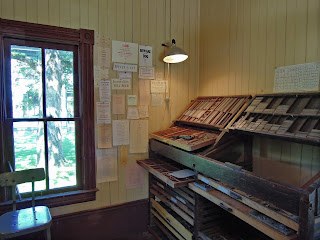Aug 29, 2012
Leiper's Fork, Tennessee
Leiper's Fork is an unincorporated village in Williamson County, Tennessee.
The village, located on the Natchez Trace Parkway, is listed on the National Register of Historic Places as a historic district containing examples of late 19th century architecture.
Early American Revolutionary War veterans from North Carolina and Virginia began to acquire land from this area in the late 1790's through land grants as payments for their service. The present village of Leiper’s Fork is situated on part of the 2,504 acres of Col. Jesse Steed, which was later purchased by Jesse Benton, who unfortunately never lived on his land due to an untimely death.
Attracted by the opportunities in the West, Jesse’s widow, Nancy, and her children moved here, to what was first known as Benton Town. Nineteen-year-old Thomas Hart Benton helped build their new home, clear their land and plant their first crops.
To help other settlers moving to the area, the Benton’s leased parts of their land to newcomers; eventually a small community grew up around them. Thomas Hart Benton, who later became a U.S. Senator for the State of Missouri, practiced law in Williamson County and was a close friend to Andrew Jackson. Today, a historic marker honors the site of the Benton home.
Aug 19, 2012
Rugby, Tennessee
Rugby is an unincorporated community in Morgan and Scott counties in the U.S. state of Tennessee. Founded in 1880 by English author Thomas Hughes, Rugby was built as an experimental utopian colony.
While Hughes' experiment largely failed, a small community lingered at Rugby throughout the 20th century. In the 1960s, residents, friends and descendants of Rugby began restoring the original design and layout of the community, preserving surviving structures and reconstructing others. Rugby's Victorian architecture and picturesque setting have since made it a popular tourist attraction. In 1972, Rugby's historic area was listed under the name Rugby Colony on the National Register of Historic Places as a historic district.
The Rugby experiment grew out of the social and economic conditions of Victorian England, where the practice of primogeniture and an economic depression had left many of the "second sons" of the English gentry jobless and idle. Hughes envisioned Rugby as a colony where England's second sons would have a chance to own land and be free of social and moral ills that plagued late-19th century English cities. The colony would reject Late Victorian materialism in favor of the Christian socialist ideals of equality and cooperation espoused in Hughes' Tom Brown's School Days.
(Source: Wikipedia)
While Hughes' experiment largely failed, a small community lingered at Rugby throughout the 20th century. In the 1960s, residents, friends and descendants of Rugby began restoring the original design and layout of the community, preserving surviving structures and reconstructing others. Rugby's Victorian architecture and picturesque setting have since made it a popular tourist attraction. In 1972, Rugby's historic area was listed under the name Rugby Colony on the National Register of Historic Places as a historic district.
The Rugby experiment grew out of the social and economic conditions of Victorian England, where the practice of primogeniture and an economic depression had left many of the "second sons" of the English gentry jobless and idle. Hughes envisioned Rugby as a colony where England's second sons would have a chance to own land and be free of social and moral ills that plagued late-19th century English cities. The colony would reject Late Victorian materialism in favor of the Christian socialist ideals of equality and cooperation espoused in Hughes' Tom Brown's School Days.
(Source: Wikipedia)
Subscribe to:
Comments (Atom)






































































